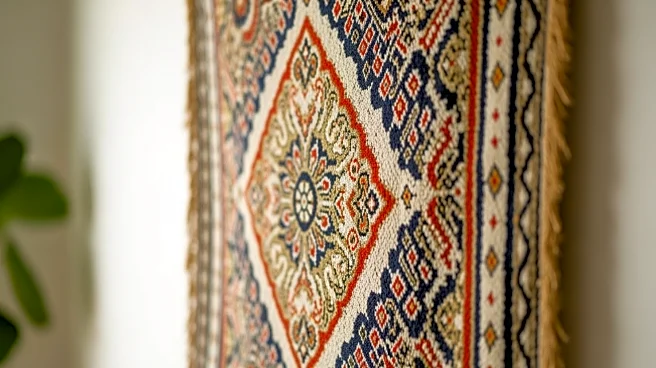What's Happening?
Tapestry, the parent company of luxury brands Coach and Kate Spade, has been recognized for its leadership in environmental sustainability. The company has made significant improvements in reducing greenhouse
gas emissions, water usage, and waste generation. Tapestry's Fabric of Change strategy focuses on investing in a diverse workforce, biodiversity solutions, product innovations, and empowering communities to support the supply chain. The company has achieved 96% renewable energy for its global operations and sourced 99% of its leather from certified responsible leather tanneries. Tapestry's initiatives, such as Coach (Re)Loved and Coachtopia, aim to offer products with a reduced carbon footprint.
Why It's Important?
Tapestry's commitment to sustainability is crucial in an industry known for its environmental challenges. The fashion industry produces 100 billion garments annually, resulting in 92 million tons of textile waste. Tapestry's efforts to reduce its carbon footprint and promote circularity in fashion set a precedent for other companies. As consumer demand for sustainable products grows, Tapestry's initiatives align with the values of younger generations who prioritize authenticity and environmental responsibility. The company's approach demonstrates that luxury brands can be both profitable and environmentally responsible.
What's Next?
Tapestry plans to continue its sustainability efforts by supporting new solar capacity projects and aiming for 40% renewable energy in its supply chain by 2030. The company also intends to phase out coal completely by 2026. As consumer expectations for sustainable fashion increase, Tapestry's initiatives are likely to influence industry standards and encourage other brands to adopt similar practices. The company's focus on traceability and collaboration with suppliers to reduce emissions further solidifies its role as a leader in sustainable fashion.
Beyond the Headlines
The shift towards sustainable fashion reflects broader cultural changes, with consumers becoming more informed about the environmental impact of their purchases. Tapestry's success in integrating sustainability into its business model highlights the potential for luxury brands to drive positive change in the industry. As consumers demand more transparency and accountability, brands that prioritize sustainability may gain a competitive edge. Tapestry's initiatives also emphasize the importance of collaboration across the supply chain to achieve meaningful environmental goals.









